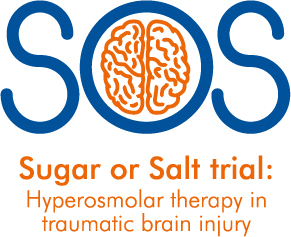SOS

Recruitment to the SOS trial has now closed.
To view information for hospital site staff, please click hereLink opens in a new window.
To view information for patients and public, please click hereLink opens in a new window.
Trial protocolLink opens in a new window
Trial statistical analysis planLink opens in a new window
Key information
Title:
Sugar or Salt (SOS) trial: Hyperosmolar therapy in traumatic brain injury
Chief Investigator:
Mr Angelos Kolias
Sponsors:
University of Warwick
University Hospitals Birmingham NHS Foundation Trust
Funder:
National Institute for Health Research (NIHR) Health Technology Assessment (HTA) Programme (17/120/01)
Registration Number: ISRCTN16075091
Summary:
Doctors need to know the best treatments for severe brain swelling after head injuries in order to improve outcomes for patients. The two main drugs that are currently used to treat brain swelling are mannitol (a sugary solution) and hypertonic saline (a strong salt solution). Both of these drugs work by reducing brain swelling which helps to reduce pressure on the brain. Currently, it is not known which drug is the most effective treatment. Both drugs have un-desirable side effects (mannitol can cause kidney failure and hypertonic saline causes an imbalance of salts in the blood). To deliver the best treatment we need to know which is most the safest and most effective.
This study is designed to work out which is the most effective treatment for brain swelling. 468 patients who have sustained a severe injury to the brain and require treatment in intensive care will take part in the study. Half the patients will receive the sugary solution and half will receive the salty solution. Which of the two treatments they receive will be decided randomly using a computer programme.
The study will compare how effective the different drugs are at reducing the pressure on the brain. It will also assess which is better at helping the patient to recover and what the side effects of treatment were. The study team will keep in contact with participants for 12 months after the study to check on how well they have recovered over time. Researchers will also calculate how much each treatment costs and compare this to how beneficial they were.
The study will take place in neurosurgical intensive care units across the UK and is expected to finish in November 2026.
Sample size:
Duration:
Primary outcome:
Enquiries:
If you have any questions about the SOS trial, please contact the trial team who will be happy to answer them.
Trial Manager: Dr Hannah Noordali
Tel: 024 761 50478
Trial Coordinator: Nadia Wustrack-Law
Tel: 024 761 51738
Email: SOStrial@warwick.ac.uk
Address:
SOS Trial
Warwick Clinical Trials Unit
Warwick Medical School
University of Warwick
Coventry
CV4 7AL

